White Lightning
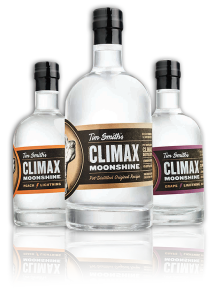
I had a query about what the hell it is that Chuck Miller distills at Belmont Farms.
Simple, really. Moonshine- White Lightning- is fresh whiskey made from a combination of corn, barley, rye or wheat. The grains are ground up and mixed with water, then cooked, mixed with yeast and malt and left to ferment. The resultant Mash is then boiled in a still. The mash vaporizes and the gas rises up into a condenser where it cools and condenses into liquid.
The product is clear, and bottled straight away without aging for the simple fact that it is usually being produced without benefit of permission of the state. You can get a delicate caramel color if you age the whiskey in casks, and Chuck is not above (or below) that.
It is a perfectly straightforward process, but there are two operations at Belmont Farms, one new and one old enough to pre-date the nation. The front end of it is the system of systems managed by farmer Miller, owner of Belmont Farms. His motto about his moonshine production is “Single estate, Grain to Glass,” and his Kopper Kettle line of fine raw whiskey and vodka.
It is an interesting story that we only scratched at yesterday. Chuck and his wife Jeanette bought the 140-acre property down the road from Refuge Farm in the 1970s with the intent of raising horses and cattle and the hay and corn to feed them. Chuck’s day job as a commercial pilot gave him the opportunity to run the farm as a side business.
This was back in the 1970s, when the wine industry was exploding in this region. Chuck saw the trend and decided to expand into grape production, but quickly discovered that it required too much labor to baby the vines and do the picking.
Casting about for another approach, he recalled that his grandfather had operated a still in the days of the Volstead Act, and had supplied the Imperial City with potable alcohol, conveniently delivered at night, to avoid the laws that they had passed and imposed on the rest of the country.
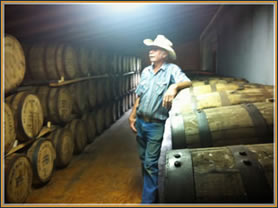
(Chuck Miller in his barrel room at Belmont Farms. Photo Chuck Miller).
Chuck didn’t have the recipe for making moonshine, but one of the older members of the family did. Great-Uncle Johnny had it, along with tall tales of the wild business of evading the Revenuers on the way to Washington and sometimes a bit of gun-play.
As a licensed pilot, Chuck is an upstanding citizen, and he set about the laborious process of obtaining the necessary permits from Richmond to do his whiskey distilling legally. It took two years, but the folks at the Bureau of Alcohol, Tobacco and Firearms in DC and the Virginia Department of Alcoholic Beverage Control in Richmond eventually said it was OK.
He found his copper still on a farm down near Charlottesville, and went into business.
Therein lies the path to the other two stories, the one stacked on the other. The distilling business has a long history on this continent, older that the Republic by far. It is easier to make whiskey than it is to make wine or brew beer. The drink of choice for Colonial America was whiskey, raw and wild.
You can even say that corn whiskey is the reason for the way our government was chartered. The Revolution established a nation independent of the Crown. It did not establish a Constitution. Instead, the Articles of Confederation governed the new relationship between the former colonies, and the nascent Continental government, and therein lay the roots of the Whiskey Insurrection, also known as Shay’s Rebellion.
It is worth a book all in itself. A revolutionary war solider named Daniel Shay- mustered out of the Continental Army without pay, returning home to find himself in deep tax trouble- often gets the credit for the revolt against Alexander Hamilton’s taxes. It is a much more nuanced story to which I don’t have time to do justice this morning.
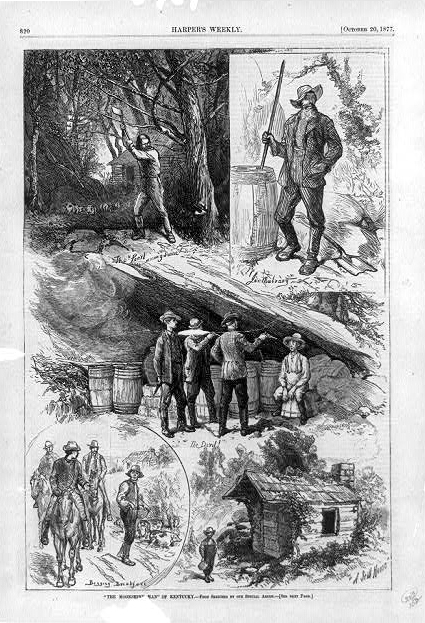
(Harper’s Weekly steel engraving of frontier moonshining, circa 1870. Image harpers).
The short answer is almost always wrong, but here goes: the brief insurrection is often depicted as being conducted by poor, Western Massachusetts farmers embittered by land seizures and bankruptcies. It was actually much more widespread than the Keystone Colony, and the taxation-without-representation thing many of the ex-soldiers had fought the Red Coats about was very much part of it. Some research into the lives of Shays Rebels suggests that Whiskey Rebels they came from “diverse socio-economic backgrounds (from the wealthiest to the poorest families in the nation), professions, and locales” and that their issues included: rule by a faraway elite, cronyism and corruption at influential levels of government, and regressive tax policy.
Stop me if you have heard this before.
Thomas Jefferson, then Ambassador to Paris, observed to a friend that a little rebellion was not a bad thing in his view, quipping: “The tree of liberty must be refreshed from time to time with the blood of patriots and tyrants. It is its natural manure.”
Mr. Jefferson was an earthy fellow, and the quote has become sanitized over time, and more noble and less farm-like.
Anyway, Chuck at Belmont Farms has been legally producing whiskey- and paying his taxes- for a long time when he was approached by a bad boy named Tim Smith:
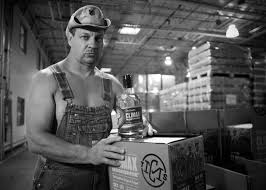
Tim is the Volunteer Fire Chief of Climax, VA, a little hamlet north of Danville near the North Carolina Border. Tim is a DESERT STORM vet, and married to a godly woman who is a school nutritionist and upstanding member of her church. Tim is also a third generation moonshiner.
I would have had to spend more time on the economics of traditional moonshining to demonstrate how embedded the custom is out in the country. Moonshine is easier to transport than grain, can be used as an alternate currency, and can be created, just at Chuck Miller does, all on one piece of property, grain to glass.
The other several Americas are still out there, though often nestled in the Hollers and on the bayous. The Discovery Channel has made some pretty good money out of making country people like the Robertsons of Duck Dynasty popular heroes- or horrors.
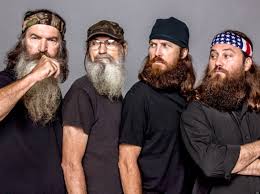
I think the Discovery Channel was interested in ridiculing them as a sort of modern day Green Acres caricature, but the vibrancy and authenticity of the family got away from them. The Robertsons and their Duck Commander still live in a world that connected to nature, and to values largely abandoned in ridicule by mainstream society. They evoke an America that seems largely mythical- or demonical- to the effete post-Baby Boomers who look a lot like Pajama Boy.
Tim Smith is riding that wave in his television show, along with his bib overalls with no shirt. His Climax Whiskey brand is a part of a total marketing package. It is authentic beyond doubt and evokes the memories of rebels from all the generations since Daniel Shay, sneering at the Federal Agents on a thousand versions of Rocky Top, driving their hot-rods at break-neck speed down the mountain to deliver white lightning to the flat-landers.
Anyway, Tim’s operations have expanded to legal distilleries in Virginia (like Belmont Farms) and Kentucky. You can check his television show, which purports to document the real life adventures of outlaw moonshiners, even as Tim goes legit through the good offices of people who actually comply with the myriad of alcohol regulations. I assume there is a product placement deal for Oshkosh bib overalls in there somewhere.
They did a lot of filming for the new fourth season of Moonshiners (Tuesdays, Discovery Channel, starting in October) so I will be tuning in to check out the neighborhood.
I was going to address Chuck Miller’s antique distilling process with his copper-pot still versus the towering modern and highly efficient column stills that allow continuous flow of mash over steam-generating plates that never need to be stopped or emptied, but clearly there is no time for that today.
I do have a large jug of Climate Moonshine and a stout clear bottle of Chuck’s Kopper Kettle white lightning. I will compare and contrast in a future review.
I think it is too soon to start drinking this morning. Of course, I am in the country, and you know different rules apply out here.
Copyright 2014 Vic Socotra
www.vicsocotra.com
Twitter: @jayare303
